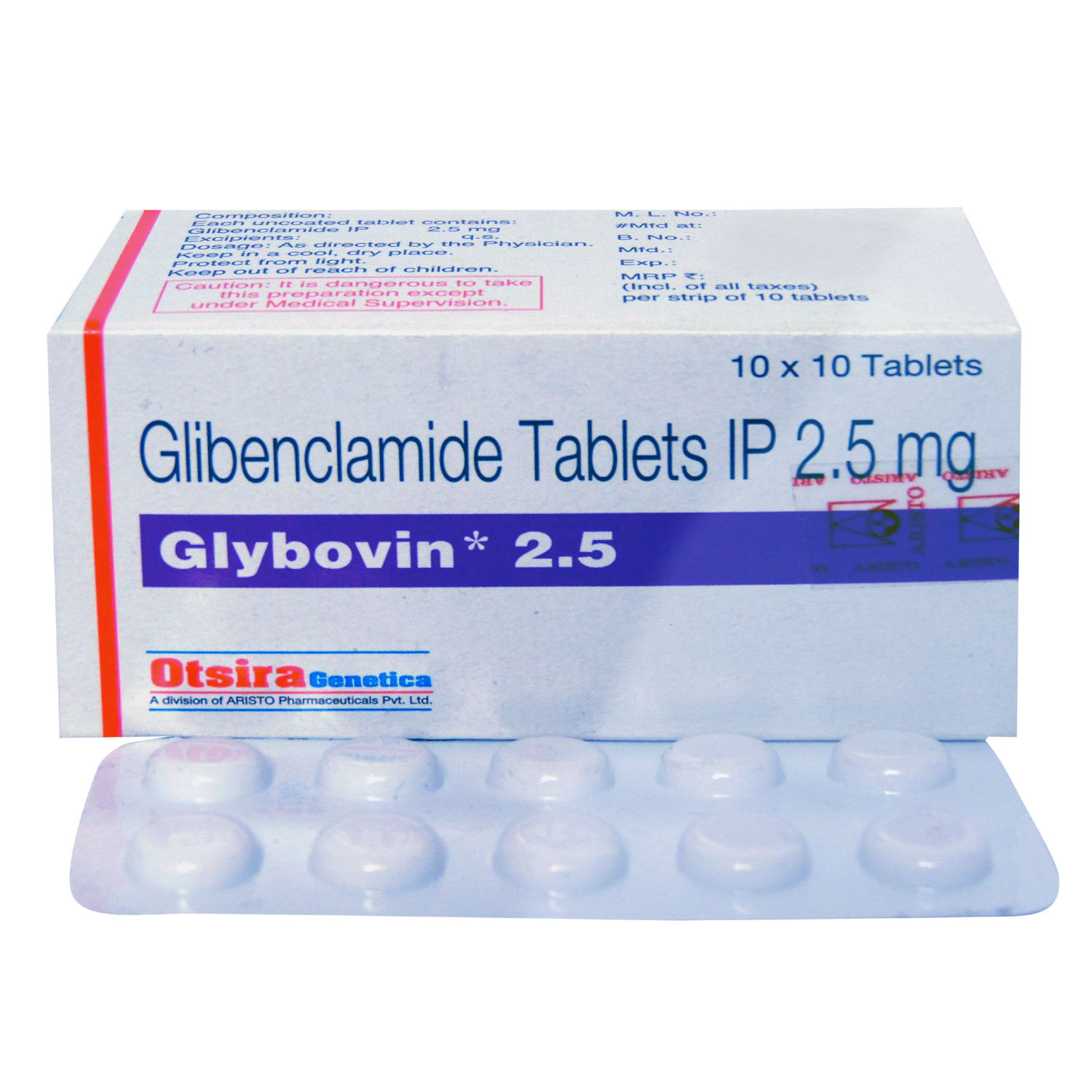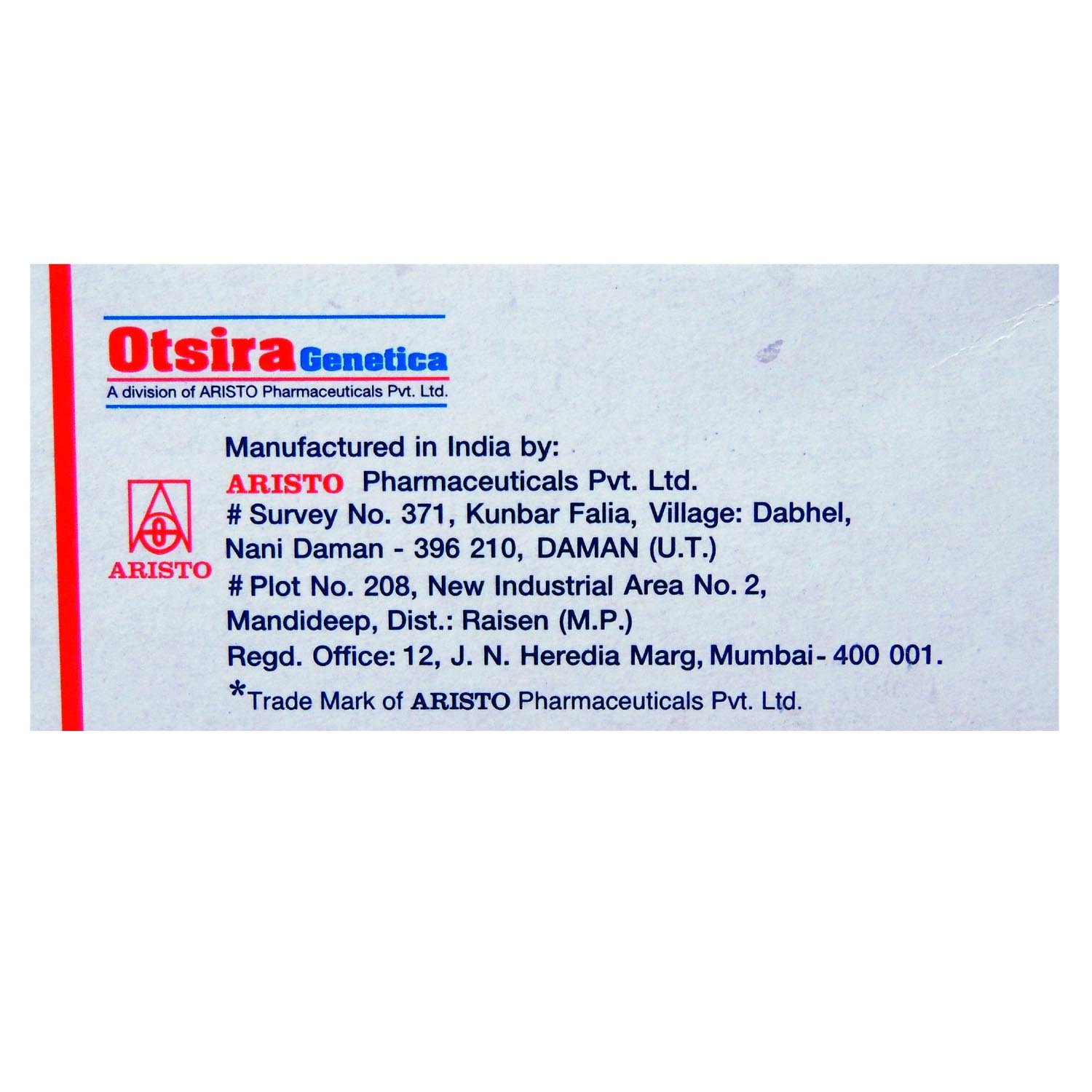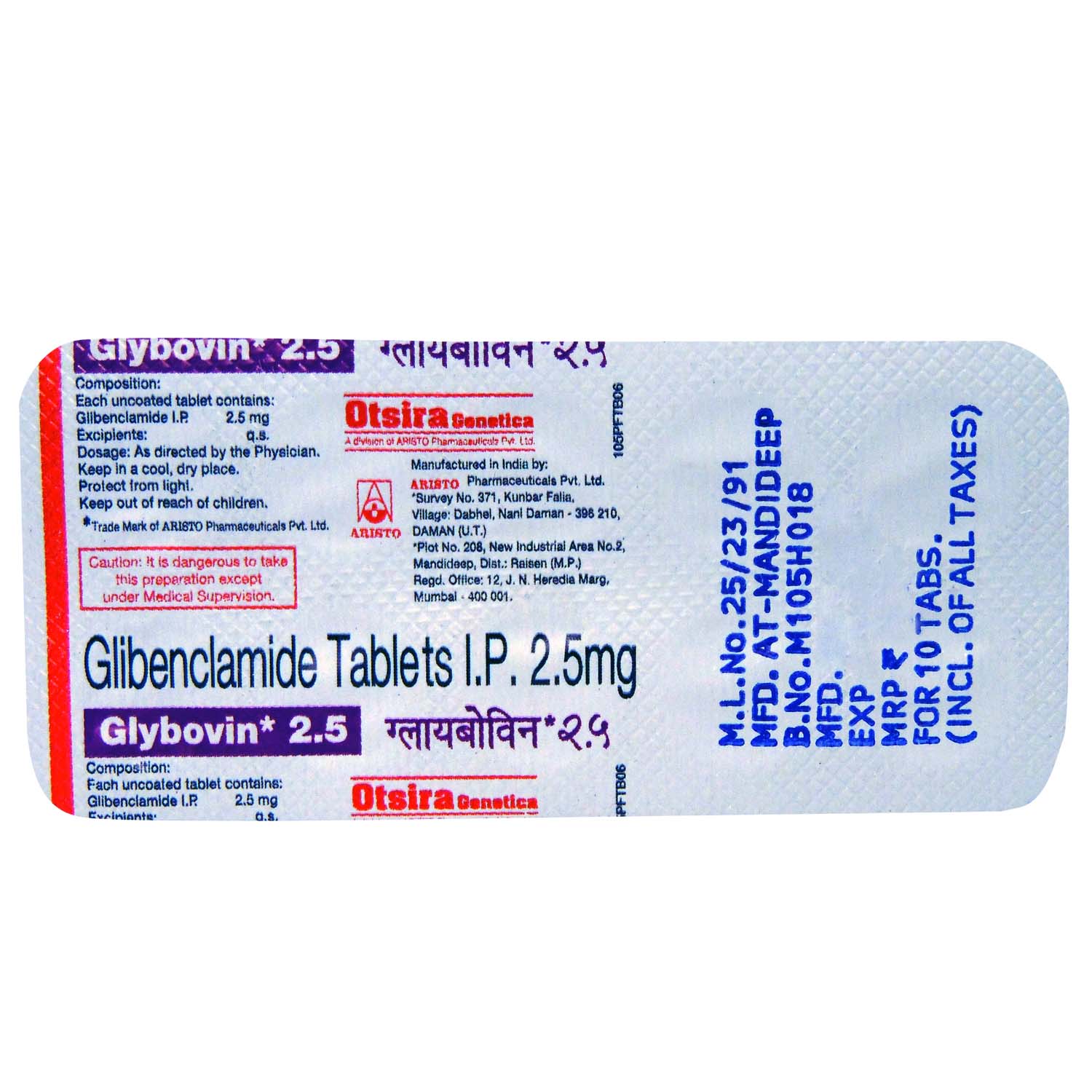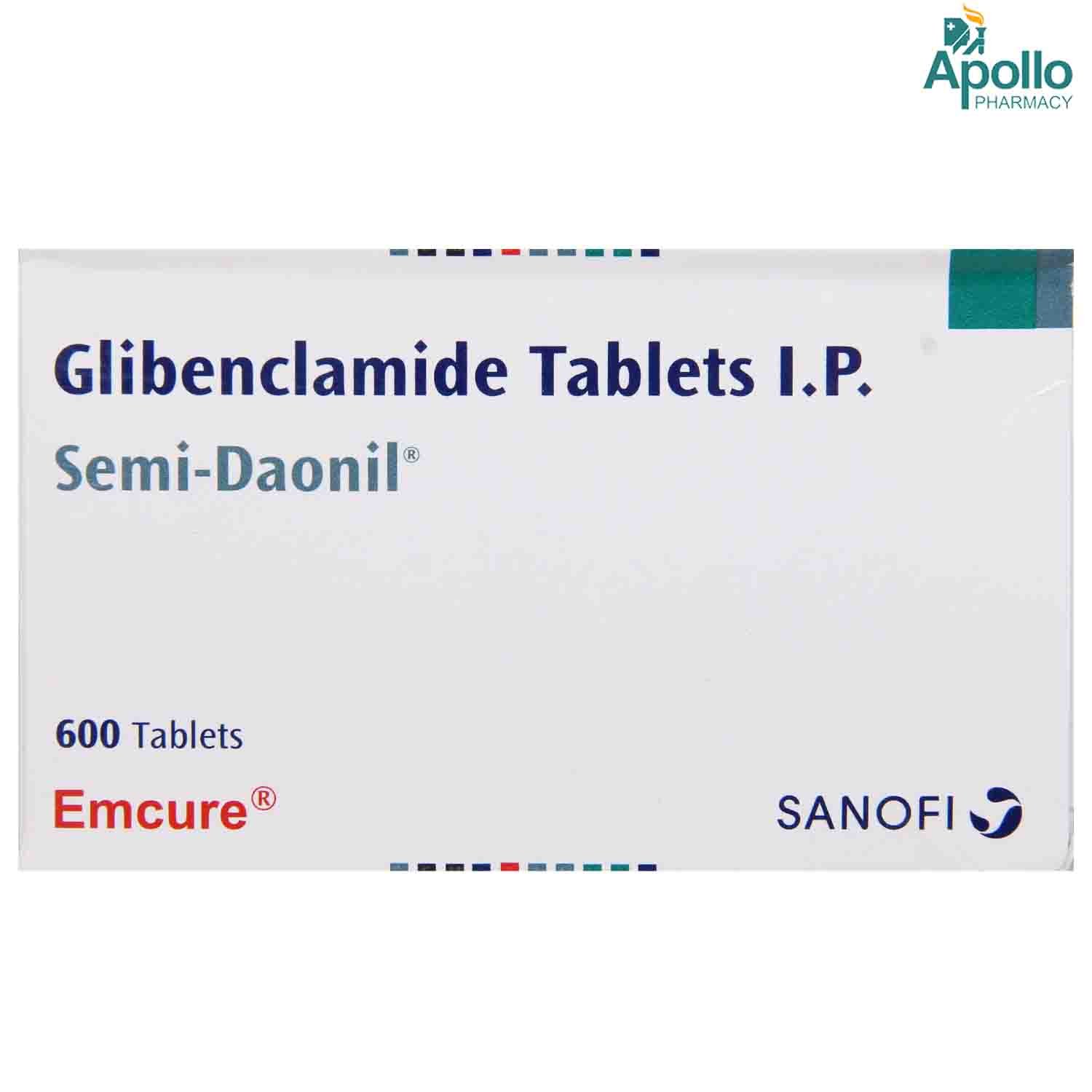Glybovin 2.5 mg Tablet 10's
MRP ₹5.5
(Inclusive of all Taxes)
₹0.8 Cashback (15%)
Provide Delivery Location
Online payment accepted
 Prescription drug
Prescription drugWhats That
Composition :
Manufacturer/Marketer :
Consume Type :
Expires on or after :
Return Policy :
About Glybovin 2.5 mg Tablet
Glybovin 2.5 mg Tablet belongs to the class of medicine called ‘oral hypoglycaemic’ used to treat type-2 diabetes. Type 2 diabetes is a chronic or lifelong condition affecting how your body processes glucose. People with type 2 diabetes either do not produce enough insulin, or if the insulin is produced, it cannot perform its function in the body (insulin resistance). Thus, the blood glucose level increases and symptoms such as frequent urination increased thirst and increased hunger.
Glybovin 2.5 mg Tablet contains Glibenclamide, which acts by increasing the amount of insulin released by the pancreas. It stimulates insulin secretion from the pancreas and decreases blood sugar levels. In a nutshell, it prevents blood glucose levels from rising to very high levels, thus keeping your diabetes under control. Glybovin 2.5 mg Tablet shows optimum effects when taken along with healthy lifestyle changes like weight loss, regular exercise, a healthy diet, etc.
Glybovin 2.5 mg Tablet should be taken with food to avoid an upset stomach.Glybovin 2.5 mg Tablet should be taken at the same time of the day each time for the best results. Your doctor will decide what dose should be taken for better advice, and it can change timely depending upon your condition. A common side effect of Glybovin 2.5 mg Tablet is low blood glucose levels characterized by dizziness, sweating, palpitations, hunger pangs, dry mouth, skin, etc. To avoid hypoglycaemia, you should not miss meals and should carry some form of sugar along with you. Other side effects include taste change, nausea, diarrhoea, stomach pain, headache, and upper respiratory symptoms.
Glybovin 2.5 mg Tablet should not be stopped even if you feel better without consulting your doctor as the sugar levels change. If you stop taking Glybovin 2.5 mg Tablet abruptly, it may increase your sugar levels, which could further increase the risk of eyesight loss (retinopathy), kidney (nephropathy) and nerve damage (neuropathy). Glybovin 2.5 mg Tablet should not be taken if you have severe kidney or liver disease, had diabetic coma. Please inform your doctor if you have had liver, kidney or heart disease, are pregnant or planning to get pregnant, breast-feeding, blood disease called G6PD-deficiency anaemia and heart disease. Mental alertness may be altered due to low or high blood sugar when Glybovin 2.5 mg Tablet is not taken regularly, which may affect your ability to drive or to operate machinery.
Uses of Glybovin 2.5 mg Tablet
Directions for Use
Key Benefits
Glybovin 2.5 mg Tablet contains Glibenclamide a 'sulfonylurea' which decreases raised blood sugar levels by stimulating insulin release from the beta cells located in the pancreas (insulin-secreting organ). In a nutshell, it prevents the blood glucose levels from rising to very high levels, thus keeping your diabetes under control. Glybovin 2.5 mg Tablet shows optimum effects when taken along with healthy lifestyle changes like weight loss, regular exercise, healthy diet, etc.
Storage
- Maintain good hygiene by washing with lukewarm water regularly.
- Moisturize your skin to keep it hydrated.
- Practice wearing loose-fitting clothes made from breathable fabrics.
- Apply cool compresses by using a damp cloth on the rashes for few minutes.
- Avoid scratching on rashes to prevent infections.
- Consider covering the rashes by using a gauge.
- Take cool baths and add baking soda or oatmeal bath products to ease itching.
Drug Warnings
Some diabetic patients taking Glybovin 2.5 mg Tablet may develop a rare but serious condition called lactic acidosis. In this condition, there is too much lactic acid accumulated in the blood. So, your liver and kidney proper functioning is required to eliminate excess lactic acid from the blood. If you are allergic (hypersensitive) to Glibenclamide or any ingredient of Glybovin 2.5 mg Tablet , have severe liver or kidney problems, have severe thyroid or adrenal gland problems, have ever had a diabetic coma, Glybovin 2.5 mg Tablet should not be taken. Consult your doctor and take only if prescribed under medical supervision. Glybovin 2.5 mg Tablet shows optimum effects when taken along with healthy lifestyle changes like weight loss, regular exercise, healthy diet, etc.
Drug-Drug Interactions
Drug-Drug Interactions
Login/Sign Up
Co-administration of Nalidixic acid can affect blood glucose levels. Both high blood glucose and, less frequently, low blood glucose have been reported.
How to manage the interaction:
Although there is a possible interaction, Glybovin 2.5 mg Tablet can be taken with Nalidixic acid if prescribed by the doctor. Consult the prescriber if you experience symptoms of low blood sugar such as nervousness, confusion, headache, dizziness, drowsiness, tremor, nausea, hunger, weakness, perspiration, palpitation, and rapid heartbeat or symptoms of high blood sugar such as increased urination, increased thirst, and increased hunger. Monitoring of blood glucose levels is advised. Do not discontinue any medications without consulting a doctor.
Co-administration of Lomefloxacin may sometimes affect blood glucose levels. Both high blood glucose and, less frequently, low blood glucose have been reported.
How to manage the interaction:
Although there is a possible interaction, Glybovin 2.5 mg Tablet can be taken with lomefloxacin if prescribed by the doctor. Consult the prescriber if you experience symptoms of low blood sugar such as nervousness, confusion, headache, dizziness, drowsiness, tremor, nausea, hunger, weakness, perspiration, palpitation, and rapid heartbeat or symptoms of high blood sugar such as increased urination, increased thirst, and increased hunger. Monitoring of blood glucose levels is advised. Do not discontinue the medications without consulting a doctor.
Co-administration of Glybovin 2.5 mg Tablet with Grepafloxacin can sometimes affect blood glucose levels. Both hyperglycemia (high blood glucose) and, less frequently, hypoglycemia (low blood glucose) have been reported.
How to manage the interaction:
Co-administration of Glybovin 2.5 mg Tablet with Grepafloxacin can possibly result in an interaction, but it can be taken if a doctor has advised it. If you experience any of these symptoms - severe infections, headaches, dizziness, drowsiness, confusion, trembling, nausea, hunger, weakness, fast heartbeat, or excessive thirst - it's best to call a doctor right away. Do not discontinue any medications without consulting a doctor.
Co-administration of Glybovin 2.5 mg Tablet with Fluconazole may cause an increase in the blood levels and effects of Glybovin 2.5 mg Tablet leading to low blood sugar levels.
How to manage the interaction:
Although there is a possible interaction, Glybovin 2.5 mg Tablet can be taken with Fluconazole if prescribed by the doctor. Consult the prescriber if you experience symptoms of low blood sugar such as nervousness, confusion, headache, dizziness, drowsiness, tremor, nausea, hunger, weakness, perspiration, palpitation, and rapid heartbeat. Monitoring of blood glucose levels is advised. Do not discontinue the medications without consulting a doctor.
Co-administration of Ofloxacin with Glybovin 2.5 mg Tablet can sometimes affect blood glucose levels. Both high blood glucose and, less frequently, low blood glucose have been reported.
How to manage the interaction:
Although there is a possible interaction, Glybovin 2.5 mg Tablet can be taken with Ofloxacin if prescribed by the doctor. Consult the prescriber if you experience symptoms of low blood sugar such as nervousness, confusion, headache, dizziness, drowsiness, tremor, nausea, hunger, weakness, perspiration, palpitation, and rapid heartbeat or symptoms of high blood sugar such as increased urination, increased thirst, and increased hunger. Maintaining blood glucose levels is advised. Do not discontinue the medications without consulting a doctor.
Co-administration of Miconazole with Glybovin 2.5 mg Tablet may increase the blood levels and effects of Glybovin 2.5 mg Tablet leading to low blood glucose levels.
How to manage the interaction:
Although there is a possible interaction, Glybovin 2.5 mg Tablet can be taken with miconazole if prescribed by the doctor. Consult the prescriber if you experience symptoms of low blood sugar such as nervousness, confusion, headache, dizziness, drowsiness, tremor, nausea, hunger, weakness, perspiration, palpitation, and rapid heartbeat. Monitoring of blood glucose levels is advised. Do not discontinue the medications without consulting a doctor.
Co-administration of Moxifloxacin may affect blood glucose levels. Both high blood glucose and low blood glucose.
How to manage the interaction:
Although there is a possible interaction, Glybovin 2.5 mg Tablet can be taken with Moxifloxacin if prescribed by the doctor. Consult the prescriber if you experience headache, dizziness, rapid heartbeat, increased urination, increased thirst, and increased hunger. Do not discontinue the medications without consulting a doctor.
Co-administration of Glybovin 2.5 mg Tablet with Ciprofloxacin may affect blood glucose levels leading to high blood glucose levels, and less frequently low blood glucose levels.
How to manage the interaction:
Although there is a possible interaction, Glybovin 2.5 mg Tablet can be taken with Ciprofloxacin if prescribed by the doctor. Consult the doctor if you experience symptoms such as headache, dizziness, drowsiness, nervousness, confusion, tremor(shaking), nausea, hunger, weakness, sweating, rapid heartbeat, increased thirst, increased hunger, and increased urination. Do not discontinue the medications without consulting a doctor.
Co-administration of Levofloxacin with Glybovin 2.5 mg Tablet may affect blood glucose levels.
How to manage the interaction:
Although there is a possible interaction, Glybovin 2.5 mg Tablet can be taken with levofloxacin if prescribed by the doctor. Consult the prescriber if you experience nervousness, confusion, headache, dizziness, drowsiness, tremors, nausea, hunger, weakness, perspiration, pulse, rapid heartbeat, increased urination, increased thirst, and increased hunger. Monitoring of blood glucose levels is advised. Do not discontinue the medications without consulting a doctor.
Co-administration of Norfloxacin with Glybovin 2.5 mg Tablet may sometimes affect blood glucose levels. Both high blood glucose and, less frequently, low blood glucose have been reported.
How to manage the interaction:
Although there is a possible interaction, Glybovin 2.5 mg Tablet can be taken with Norfloxacin if prescribed by the doctor. Consult the prescriber if you experience symptoms of low blood sugar such as nervousness, confusion, headache, dizziness, drowsiness, tremor, nausea, hunger, weakness, perspiration, palpitation, and rapid heartbeat or symptoms of high blood sugar such as increased urination, increased thirst, and increased hunger. Maintaining blood glucose levels is advised. Do not discontinue any medications without consulting a doctor.
Drug-Food Interactions
Drug-Food Interactions
Login/Sign Up
Diet & Lifestyle Advise
- Fill your half plate with starchy veggies, a quarter with proteins and a quarter with whole grain.
- Eat at regular intervals. Do not take a long gap between a meal or snack.
- Monitor your blood sugar level regularly, especially when there are a lot of fluctuations.
- Invest at least 150 min of moderate-intensity physical activity and 15 minutes of high-intensity exercise every week.
- Lose weight gradually to achieve a healthy body mass index (18.5 to 24.9).
- Replace refined carbohydrates containing whole-grain foods and increase intake of fruits and veggies and other fiber-enriched foods.
- Reduce intake of saturated fat (or hidden fats) in food like chips, crisps, pastries, biscuits, and samosas. Choose omega 3 fatty acid-containing oils for daily cooking. You may use palm oil, mustard oil, groundnut oil, rice bran oil and safflower oil for frying.
- Do not take stress as it may elevate your blood sugar level. You may adopt stress management techniques like mindfulness, yoga, or meditation to control stress-related blood sugar changes.
- Opt for low-fat dairy products (low-fat yogurt, fat-free milk, and cheese, etc.).
- Keep your blood pressure as normal (120/80) as possible as it reduces the risk of cardiovascular diseases in diabetes patients.
Side Effects of Glybovin 2.5 mg Tablet
- Low blood sugar (hypoglycaemia)
- Nausea
- Heartburn
- Feeling of fullness
- Vomiting
- Diarrhoea
- Abdominal pain
- Weight gain
Habit Forming
Therapeutic Class
All Substitutes & Brand Comparisons
RX
Out of StockSemi Codica 2.5mg Tablet
Swiss Pharma Pvt Ltd
₹2.96
(₹0.27 per unit)
46% CHEAPERRX
Out of StockGlibedac 2.5mg Tablet
Innovative Pharmaceuticals Pvt Ltd
₹6.75
(₹0.61 per unit)
21% COSTLIERRX
Out of StockSEMI DAONIL 2.5MG TABLET
Emcure Pharmaceuticals Ltd
₹7
(₹0.63 per unit)
26% COSTLIER
Drug-Diseases Interactions
Drug-Diseases Interactions
Login/Sign Up
Compared to diet alone or diet plus insulin, the use of oral hypoglycemic medicines may be linked to a higher risk of cardiovascular mortality. The University Group Diabetes Programme (UGDP) project, a lengthy prospective clinical trial created to assess the efficacy of glucose-lowering medications in preventing or postponing vascular problems in individuals with non-insulin-dependent diabetes, is the basis for this warning. Since the cardiovascular death rate was almost 2.5 times higher in patients receiving diet plus a fixed dosage of either tolbutamide (a sulfonylurea) or phenformin (a biguanide) for 5 to 8 years, both of these therapies were stopped in the research. Despite disagreements surrounding how to interpret these findings, physicians and patients should be aware of the possibility
How to manage the interaction:
Oral hypoglycemic agents may be associated with an increased risk of heart problems. Let the doctor know if you have heart problems.
sulfonylureas are metabolized in the liver, and their metabolites (some with pharmacologic activity) are excreted in the urine and feces. Patients with impaired liver and/or renal function treated with sulfonylureas may be exposed to higher serum drug concentrations, which can increase the potential for severe hypoglycemic episodes induced by these agents. In the presence of hepatic impairment, gluconeogenic capacity may also be diminished, further compounding the risk. Therapy with sulfonylureas should be administered cautiously in patients with liver and/or renal disease. Reduced dosages and longer intervals between dosage adjustments may be required. Hypoglycemia, if it occurs during treatment, may be prolonged in these patients because of slowed metabolism and/or excretion of the drugs.
How to manage the interaction:
Therapy with sulfonylureas should be administered cautiously in patients with liver disease.
When receiving therapy with insulin and/or oral hypoglycemic medications, hypoglycemia can frequently happen. Patients who may be particularly vulnerable to the onset of hypoglycemic episodes while taking these medications include those who are weak or malnourished, those who have faulty counterregulatory mechanisms (such as autonomic neuropathy and adrenal or pituitary insufficiency), and those who are taking beta-adrenergic blocking medications.
How to manage the interaction:
During treatment with oral hypoglycemic agents low blood sugar may commonly occur. Caution is advised in patients who may be particularly susceptible to the development of hypoglycemic episodes, including those who are weak or malnourished, those with autonomic neuropathy and adrenal or pituitary insufficiency, and those receiving beta-adrenergic blocking agents.
In people who lack the enzyme glucose 6-phosphate dehydrogenase (G6PD), sulfonylureas can lead to hemolytic anaemia. Patients with G6PD deficiency should use these medications with caution and may want to look for non-sulfonylurea alternatives. Following the launch of these medications, reports of hemolytic anaemia in people who had no known G6PD deficiency were made.
How to manage the interaction:
Therapy should be used with caution in patients with glucose 6-phosphate dehydrogenase (G6PD) deficiency and the use of a non-sulfonylurea alternative should be considered as sulfonylureas may cause hemolytic anemia in patients with G6PD deficiency.
In individuals who are taking other drugs, have medical problems that are known to induce hyponatremia, or have conditions that promote the release of antidiuretic hormone, treatment with sulfonylureas may result in hyponatremia. Certain sulfonylureas have been linked to the syndrome of inappropriate antidiuretic hormone (SIADH) secretion, and these medications may enhance the peripheral (antidiuretic) action of ADH or increase ADH release. Patients with hyponatremia or those who are more likely to develop it, such as the elderly, those on diuretics, or those who are volume-depleted, should be treated with caution.
How to manage the interaction:
Treatment with sulfonylureas may cause hyponatremia (low sodium level), in patients who are on other medications or have medical conditions known to cause hyponatremia or increase release of antidiuretic hormone. Caution should be used when treating patients with hyponatremia or at greater risk of developing hyponatremia such as elderly patients, patients taking diuretics or those who are volume-depleted.
FAQs
Glybovin 2.5 mg Tablet contains Glibenclamide, which increases the amount of insulin released by the pancreas. It stimulates insulin secretion from the pancreas and decreases blood sugar levels. In a nutshell, it prevents blood glucose levels from rising to very high levels, thus keeping your diabetes under control.
Glybovin 2.5 mg Tablet should be avoided in patients who are allergic to any of this medicine's components or excipients. It should be avoided in patients suffering from moderate to severe kidney disease and in patients with underlying metabolic acidosis, including diabetic ketoacidosis.
Yes, Glybovin 2.5 mg Tablet can cause constipation. Eat a proper well-balanced diet and drink plenty of fluid to avoid it.
Yes, Glybovin 2.5 mg Tablet is known to cause an upset stomach if taken empty stomach. So, it should be preferably taken with a meal or just after a meal to avoid an upset stomach.
No, Glybovin 2.5 mg Tablet is only prescribed for the treatment for the type 2 diabetes along with a healthy diet and lifestyle. It should not be taken for the treatment of type 1 diabetes.
Hypoglycemia refers to low blood sugar levels. The symptoms of hypoglycemia (low blood sugar) include sweating, feeling shaky or anxious, looking pale, feeling hungry, feeling dizzy, and feeling that your heart is pounding (palpitations). Glybovin 2.5 mg Tablet can cause hypoglycemia. Hypoglycemia can occur if you miss or delay your food, drink alcohol, over-exercise or take other antidiabetic medicine along with Glybovin 2.5 mg Tablet . People with diabetes are advised to keep a quick sugar source like glucose tablets, honey or fruit juice.
Drug-Drug Interactions Checker List
- ASPIRIN
- HEPARIN
- ENALAPRIL
- CIMETIDINE
- RANITIDINE
- PHENYLBUTAZONE
- CLOFIBRATE
- NORTRIPTYLINE
- CAPTOPRIL
Special Advise
- Your doctor may advise regular liver function tests to look for symptoms of any liver problems.
- Inform your doctor about the use of Glybovin 2.5 mg Tablet before any surgery, and the doctor may advise insulin before surgery.
Disease/Condition Glossary
Diabetes Mellitus type 2: It is a condition in which either the body stops producing enough insulin (the hormone which helps to decrease sugar levels in the blood) or resistance to insulin action. As a result, excessive insulin is produced. Still, it fails to act on the organs of the body. Type 2 diabetes symptoms include feeling exhausted all time, feeling thirsty, having blurry vision, and the urge to urinate (pee) more often. Complications of type 2 diabetes include skin infection, eye problems (retinopathy), nerve damage (neuropathy), diabetic foot (foot ulcer), kidney disease (nephropathy), high blood pressure and even stroke. Both low and high blood sugar levels can be dangerous and should be treated as soon as possible. Your HbA1c below 5.7% is normal, 5.7-6.4% confirms the prediabetes stage and 6.5% or greater states diabetes condition.

Have a query?
Alcohol
Safe if prescribed
Glybovin 2.5 mg Tablet should not be taken until prescribed if you are taking alcohol. Taking Glybovin 2.5 mg Tablet with alcohol can cause hypoglycemia. So, keep your doctor informed if you drink alcohol.
Pregnancy
Consult your doctor
As the data around the use of Glybovin 2.5 mg Tablet in pregnant women is limited, the use of Glybovin 2.5 mg Tablet in pregnancy is restricted. It is highly recommended to consult your doctor before taking this drug in case you are pregnant.
Breast Feeding
Consult your doctor
Tell your doctor if you are breastfeeding. Do not breastfeed while you are taking Glybovin 2.5 mg Tablet without advice from your doctor.
Driving
Safe if prescribed
Glybovin 2.5 mg Tablet may cause hypoglycemia (low blood sugar levels) whose symptoms include unusual sleepiness, shivering, palpitations, sweating, etc. This may affect your ability to drive. Use caution while driving or doing anything that requires concentration or mental alertness.
Liver
Consult your doctor
Glybovin 2.5 mg Tablet to be taken with caution, especially if you have a history of liver diseases/conditions. The dose may have to be adjusted by your doctor, depending on your liver function tests.
Kidney
Consult your doctor
Glybovin 2.5 mg Tablet is unsafe, especially if you have a history of kidney diseases/conditions.
Children
Safe if prescribed
Glybovin 2.5 mg Tablet is not recommended for children below the age of 18 years. The safety and effectiveness of Glybovin 2.5 mg Tablet have not been established in children due to limited evidence. So, only take Glybovin 2.5 mg Tablet if the doctor has prescribed you.












